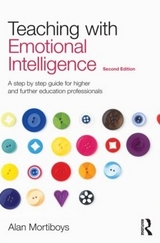
Teaching with Emotional Intelligence
A Step-by-Step Guide for Higher and Further Education Professionals
Seiten
2005
Routledge Falmer (Verlag)
978-0-415-35088-4 (ISBN)
Routledge Falmer (Verlag)
978-0-415-35088-4 (ISBN)
- Titel erscheint in neuer Auflage
- Artikel merken
Zu diesem Artikel existiert eine Nachauflage
Featuring lots of jargon-free activities, checklists and points for deeper reflection, the guidance in this book aims to help teachers encourage their learners to become more engaged, creative and motivated through the use of emotional intelligence.
The way emotions are handled by the individual and by others is central to the success of learning. Teaching with Emotional Intelligence shows how to manage this influential but neglected area of learning.
Taking the reader step by step through the learning process and looking at the relationship from the perspectives of both the teacher and the learner, this book will help the reader to:
* plan the emotional environment
* learn how to relate to learners
* listen to learners effectively
* read and respond to the feelings of individuals and groups
* develop self-awareness as a teacher
* recognize prejudices and preferences in oneself
* improve non-verbal communication.
Featuring lots of activities, checklists and points for deeper reflection, the guidance in this book will help teachers encourage their learners to become more engaged, creative and motivated.
The way emotions are handled by the individual and by others is central to the success of learning. Teaching with Emotional Intelligence shows how to manage this influential but neglected area of learning.
Taking the reader step by step through the learning process and looking at the relationship from the perspectives of both the teacher and the learner, this book will help the reader to:
* plan the emotional environment
* learn how to relate to learners
* listen to learners effectively
* read and respond to the feelings of individuals and groups
* develop self-awareness as a teacher
* recognize prejudices and preferences in oneself
* improve non-verbal communication.
Featuring lots of activities, checklists and points for deeper reflection, the guidance in this book will help teachers encourage their learners to become more engaged, creative and motivated.
Introduction 1. Using Emotional Intelligence in Your Teaching 2. How you Relate to your Learners 3. Planning the Emotional Environment 4. Planning for the Physical Experience of Learners 5. Dealing with Your Learners’ Expectations 6. Acknowledging Individual Learners 7. Listening to Your Learners 8. Reading and Responding to the Feelings of Individuals and Groups 9. Responding to Learners’ Comments and Questions 10. Developing Self-Awareness as a Teacher 11. Recognising Your Prejudices and Preferences 12. Your Nonverbal Communication 13. Acknowledging and Handling Your Feelings 14. Revealing Your Feelings to Learners 15. Continuing your Development as an Emotionally Intelligent Teacher
| Erscheint lt. Verlag | 30.6.2005 |
|---|---|
| Zusatzinfo | 3 Line drawings, black and white; 10 Tables, black and white |
| Verlagsort | London |
| Sprache | englisch |
| Maße | 156 x 234 mm |
| Gewicht | 295 g |
| Themenwelt | Geisteswissenschaften ► Psychologie ► Pädagogische Psychologie |
| ISBN-10 | 0-415-35088-3 / 0415350883 |
| ISBN-13 | 978-0-415-35088-4 / 9780415350884 |
| Zustand | Neuware |
| Haben Sie eine Frage zum Produkt? |
Mehr entdecken
aus dem Bereich
aus dem Bereich
Grundlagen, Diagnostik und Förderung
Buch | Softcover (2023)
Kohlhammer (Verlag)
CHF 39,95
beliebte Übungen für die Arbeit mit Gruppen
Buch (2023)
Borgmann Media (Verlag)
CHF 30,70
Buch | Softcover (2024)
Springer (Verlag)
CHF 34,95



